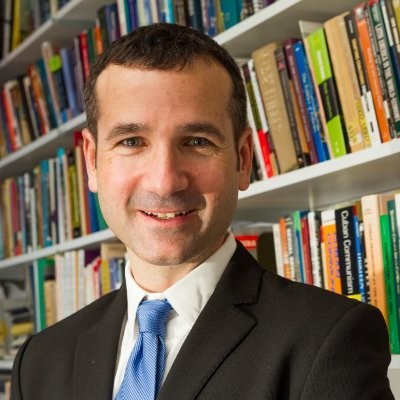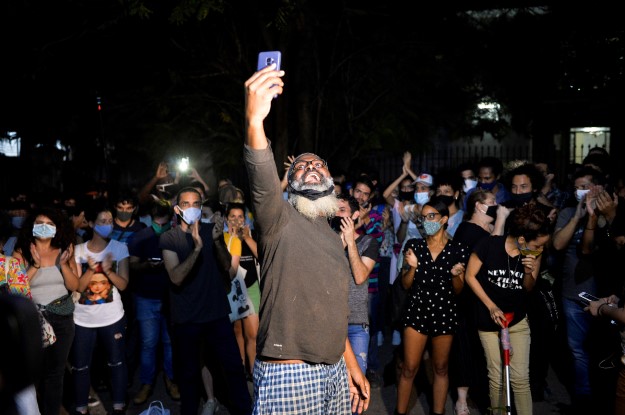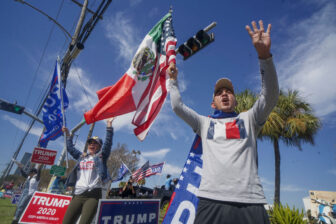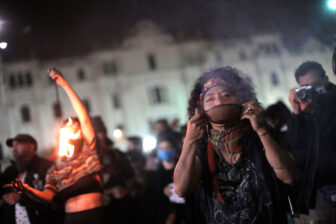At the end of November, a group of approximately 500 Cubans staged a small protest outside the Ministry of Culture. This group, now called the N27, demanded the end to the permanent harassment directed toward a young social movement of mostly Afro-Cuban artists and musicians called the San Isidro Movement.
Like the Black Lives Matter movement in the United States, the N27 protest was sparked by police brutality against Afro-Cubans. The focal incident was the arrest of rapper Denis Solís, one of San Isidro’s members. The incident was caught on a cell phone video which went viral on social media, prompting an outpouring of public dismay – and strong support for Solís and his defenders. Some backing came from the usual suspects, well-known dissident figures. But it also appears to have caught the imagination of newcomers: Artists, intellectuals, and even clergy members who have traditionally been partial to the Cuban regime.
Also like Black Lives Matter, the Cuban protest experienced an expansion of its demands. What began as a modest call for more respect for the movement’s autonomy and the liberation of Solís has now become a protest against the entire Cuban system. Meanwhile, the timing – just as a new U.S. president is about to take office – raises questions about how Washington should respond, if at all.
It’s important to understand the magnitude of what the movement is attempting to accomplish. They are challenging three of Cuba’s largest historical norms.
The first norm is the ban on group protests. In Cuba, it is never OK to protest in groups. An individual can protest solo at a party-sponsored event, at a meeting of a committee for the defense of the revolution, or even in the workplace. You can complain about corruption, bureaucracy, shoddy public services and management decisions. What you cannot do is organize a group on behalf of your demand. More than freedom of expression, the Cuban government goes after freedom of association. The moment two or more people join in protest, security forces act swiftly, decisively and often brutally. The result is that associational life in Cuba remains incipient, small and vulnerable, which is quite an exception in a region recognized worldwide as having some of the most powerful social movements in the world.
The second norm that the N27 movement is defying is the ban on complaints about the system, or more specifically, about Cuba’s system of discipline. The Cuban regime, like most mature dictatorships, has updated its system of discipline to the information age. The killings, firing squads, mass indoctrination and long-term imprisonment of its initial decades have been replaced or supplemented with public forms of character assassination, open threats to family members, careful monitoring of media posts, control of job opportunities, and short-term detentions. The N27 movement is calling for an end to this system of discipline.
The size of the protest may be micro, but its demands are now anything but. By defying these norms, the N27 could very well be going too far. After all, the ban on associations and the over-reliance on discipline are the only things keeping this ancient regime alive.
Meanwhile, the N27 movement is also taking on a third and final norm: It is mounting an attack on the system by placing the issue of racial justice front and center.
It is shocking that Cuba, a country with such a long and well-documented history of racism, has been so nonchalant about racial injustice. The Cuban Revolution, like many other Latin American regimes of the 20th century, embraced the mythology of racial equality. The thinking went: It is the Americans who are racists and segregationists; we in contrast embrace our mixed heritage. In Cuba, the myth of racial equality was reinforced by the government’s argument that capitalism is the source of racism and education, its antidote. Eliminate capitalism and provide education for all, and you solve racism.
Historically, anyone in Cuba challenging this sacrosanct discourse of racial triumph would be summarily dismissed, often quite literally. In 2013, Roberto Zurbano, a literary editor who dared to publish an op-ed in The New York Times entitled “For Blacks in Cuba, the Revolution Hasn’t Begun,” was dismissed from his job.
Of course, Zurbano was right. Racism is not tied to one type of economy or addressable with only one type of policy. And yet, Cuba has refused to move beyond this facile approach to racism. For years, the country’s leadership remained very white. It was almost as if they were saying: “Racial representation: Who needs it?”
Although things have changed a bit at the level of representation in recent years, the changes remain minor. Yes, more Black officials are now part of the leadership, but Black Cubans continue to be excluded from the new economic model, as Zurbano argued. Most jobs in the foreign sector go to white Cubans (los “presentables”, some call them). Most opportunities to migrate, and thus, to get remittances, go to white Cubans. Consequently, racism has remained disproportionately indecent.
The current protest in Cuba is certainly not the first, nor the largest, nor the most daring ever to take place in post-Soviet Cuba. In the early 2000s, the Varela project, an effort calling for democratic reforms, collected more than 11,000 signatures before its leaders were repressed or killed. Since 2003, the Ladies in White, a group of mothers, wives, and female relatives of political prisoners, have been staging marches across Cuba. They too have been arrested or harassed by government-sponsored mobs.
What is new about the N27 movement is its attempt to call out the system by also calling out the system’s racism. Like a sister movement also hoping to break in, the autonomous LGBT movement in Cuba, the N27 faces the obvious challenge of all contemporary identity politics movements: To build a cross-class societal coalition in a nation where majorities are complacent about this form of inequity. Gaining international support is also, of course, a challenge.
President-elect Joe Biden’s administration, which comes into office better informed than its predecessor about the importance of identity politics, racial justice and sexuality demands, ought to be prepared to handle this new chapter in Cuba’s history.
The choice should not be the stale debate between redoubling or removing U.S. sanctions. Biden needs to abandon the fruitless binary that has characterized the last decade of U.S. foreign policy toward Cuba. President Donald Trump’s policy of “maximum pressure” produced two undesirable goals: entrenchment of both the leadership and the humanitarian crisis. And former President Barack Obama’s policy of concessions toward Cuba without a quid pro quo produced an easy pass for Cuba’s repressors. These binary approaches didn’t work.
Biden faces the opportunity to turn economic sanctions into negotiating tools. These tools need to be calibrated in response to changes by Cuban authorities, something Obama was unwilling to do. Biden also faces an opportunity to create a stronger international coalition of leftists to bring pressure on the Cuban regime, something Trump had no moral authority (or desire) to organize.
Biden could very well deliver. He seems to have enough experience with realpolitik to transform, rather than end, the sanctions regime. He also has the international credentials to build a coalition of the left, rather than just the right, to support his efforts.
—
Corrales is a professor of political science at Amherst College and member of the editorial board of Americas Quarterly.








